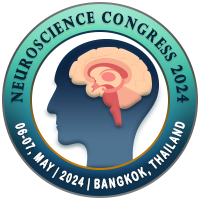.jpg)
Xi Jin Wang
Tongji University, ChinaTitle: Association of sleep disturbance with dyskinesia in Parkinson’s Disease
Abstract
Dyskinesia is one of the most disabling motor complications in Parkinson’s Disease (PD). Sleep is crucial to keep neural circuit homeostasis, and PD patients often suffer from sleep disturbance. Disrupted slow-wave sleep could accelerate the progression of PD. Prior research indicated that sleep disturbance might precede motor symptoms in PD. It is widely believed that slow homeostatic adjustment of intrinsic excitability occurring during sleep is fundamental for the stabilization of the network by gradual modification of plasticity thresholds. Moreover, sleep deprivation led to anticipation and aggravation of dyskinesia in rats, supporting an association between sleep disturbance and the development of dyskinesia. In recent years, a bulk of evidence has shown that dyskinesia is associated with neurodegeneration in cortical and subcortical areas, including the prefrontal cortex, primary motor cortex, striatum, subthalamic nucleus, and cerebellum. Cortical activity was observed to be dominated by spindles and slow waves during sleep. Sleep could enable a downward firing rate to maintain homeostasis and overall sleep slow-wave activity potentiates the majority of cortical synaptic plasticity, implying that sleep disturbance could disrupt synaptic plasticity or synaptic homeostasis. As a result, bad sleep quality may increase the risk of developing dyskinesia in PD by interrupting neural circuit homeostasis. These findings, together with ours, provide important clues for further investigation of pathogeneses and treatments of dyskinesia.
Biography
Xi-Jin Wang has completed his PHD at the age of 33 years from Shanghai Jiao Tong University, China. He is the director of Department of Neurology, Shanghai Tongji Hospital, School of Medicine, Tongji University, Shanghai, China. He is the chairman of the Neurodegenerative Disease Committee of China Association for Promotion of Health Science and Technology.

